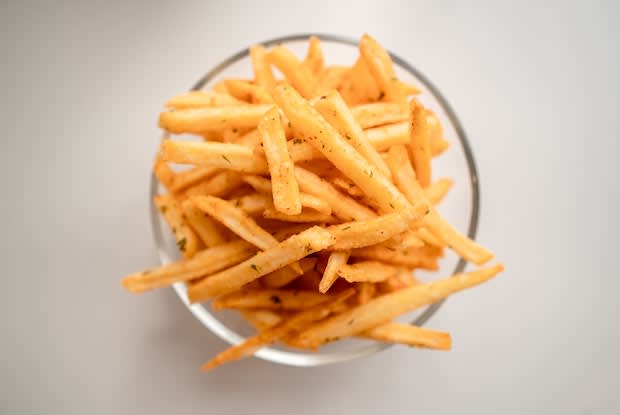Table of Contents
I. Irritable Bowel Syndrome Overview
Irritable Bowel Syndrome Overview
Irritable bowel syndrome (IBS) is a type of gastrointestinal disorder characterized by bloating, abdominal pain, and altered bowel habits. IBS typically causes chronic diarrhea (IBS-D) or constipation (IBS-C). Severe symptoms of IBS can be treated with medications like Xifaxan (rifaximin), Linzess (linaclotide), or Amitiza (lubiprostone). A small number of people with IBS experience severe symptoms, and most cases can be managed with diet changes and lifestyle improvements. If you live with IBS, it can be very helpful to learn your triggers. Read on to learn more about the most common IBS triggers. [1]
Common Food Triggers
Your daily consumption habits may be one of the most direct factors that impact IBS symptoms. There is not a definitive list of exact foods that cause IBS flare-ups because triggers are different for different people. However, the following known offenders can give you a good starting point for finding your personal triggers.
Dairy: dairy and milk products can lead to diarrhea because they are high in fat. Dairy products can also cause IBS to flare if you have lactose intolerance. If you find that dairy triggers your IBS and decide to cut out dairy from your diet, it is important to have alternative sources of calcium. [2]
Fried foods: fries, onion rings, and other fried foods are tasty but can take a fairly serious toll on IBS patients. Like dairy, fried foods are high in fat. Frying food also changes its chemical makeup and makes it harder to digest. Grilling or baking food is a healthier way to prepare food and is easier on the digestive system. [2] Insoluble fiber: fiber is generally healthy for the digestive system and promotes better bowel movements, but many people aren’t aware that there are two types of fiber. Soluble fiber is the first type and is great for people with IBS. Insoluble fiber is the second type and isn’t so great for IBS because it can worsen abdominal pain and bloating. You can increase your soluble fiber intake by eating beans, fruits, and oat products. Whole grains and vegetables are high in insoluble fiber and may need to be avoided, especially during flare-ups. [2] Other: processed foods commonly trigger IBS because of their high sugar, fat, and salt content. Processed foods also use additives and preservatives that are unhealthy for people with or without IBS. Sugar-free sweeteners aren’t a healthy alternative. Despite being sugarless, sweeteners are artificial and can be difficult for the body to absorb. Other common triggers include alcohol, garlic, onions, broccoli, and chocolate. [2] While foods may be the obvious triggers, strong emotions like stress, anxiety, and depression can also cause IBS flare-ups. This occurs when pain signals in your colon and gut are activated by these emotions. Some say that the gut has a mind of its own. This may sound like nonsense, but this statement is partially true. [3] Your enteric nervous system (ENS) connects neural structures to the bowel wall. [4] The ENS includes many neural circuits responsible for modulating blood flow, secretions, and several motor functions. [5] If you have ever felt butterflies in your stomach when you are nervous, that is the ENS at work. Attending to your mental health can be beneficial for avoiding IBS flare-ups. [3] Because anxiety, stress, and depression are not quantifiable objects you can see and avoid, you may need to rely on coping mechanisms to avoid these triggers. Mind-body exercises like meditation, yoga, Tai Chi, and Qi Gong can help your body relax. Physical activities like running, swimming, or playing a sport can also curb stress. [3] Sleep disturbances are more common in people with IBS. Disruptive IBS symptoms that interfere with daytime activities can also interfere with your sleep quality. Conversely, not getting adequate sleep can cause IBS flare-ups to occur more often. Studies show that disturbed sleep can lead to worse mood and abdominal pain in IBS patients. [6] If you find that sleep disturbances are a trigger for you, talk to your doctor for ways to help you sleep better at night. If you have been prescribed Xifaxan (rifaximin), Linzess (linaclotide), or Amitiza (lubiprostone) as part of your treatment plan for IBS, you may need to watch out for drug interactions that can act as a trigger. Some types of antibiotics, antidepressants, and medicine made with sorbitol can lead to constipation or diarrhea in those with IBS. Before starting any IBS medications, let your doctor know about any other conditions you have or any medications you are taking. With the right help and treatment plan, it is possible to avoid IBS triggers and lead a healthy life. The content in this article is intended for informational purposes only. This website does not provide medical advice. In all circumstances, you should always seek the advice of your physician and/or other qualified health professionals(s) for drug, medical condition, or treatment advice. The content provided on this website is not a substitute for professional medical advice, diagnosis, or treatment.
Psychological Triggers

Sleep Disturbances

IBS Treatment Plan
